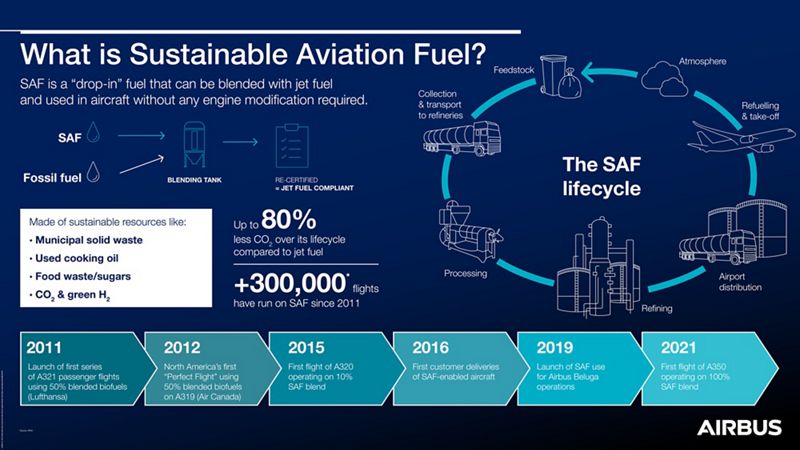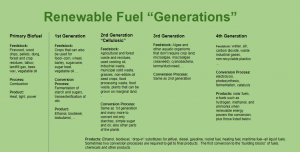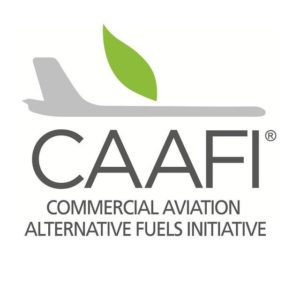by Gaulthier Blangez* (Advanced Biofuels USA) What are we talking about? Do you know that airlines' activities, from passenger transportation to freight are responsible for two to three percent of anthropic emissions yearly according to the latest Intergovernmental Panel on Climate Change (IPCC) report?
 Indeed, flying comes at a cost. But while the number of planes over our heads was increasing, the industry started to think about how it could become sustainable to make people fly. Several paths are being explored, amongst them: lighten planes and onboard equipment, electrify taxi phases, optimize routes.
Indeed, flying comes at a cost. But while the number of planes over our heads was increasing, the industry started to think about how it could become sustainable to make people fly. Several paths are being explored, amongst them: lighten planes and onboard equipment, electrify taxi phases, optimize routes.
Another initiative considered by both companies and governments is the use of advanced biofuels. Nevertheless, because of the central position of fuels in this industry, the transition seems quite challenging. In this article we’ll depict briefly everything you need to know about this blooming revolution.
What is a sustainable aviation fuel?
A sustainable aviation fuel (or SAF) is a fuel that is produced sustainably with feedstocks other than crude oil. Nonetheless, all feedstocks aren’t comparable. To organize it and understand what is SAF we refer to generations and we count four of them:
- The first generation is using feedstock compatible with human nutrition. We’re mainly talking about crops (corn/maize, soybean, sunflower and rapeseed). By extension all other crops using soil that could be dedicated to agronomic purposes are rated as first generation.
- The second generation uses wastes and lignocellulosic biomass as primary feedstocks. Lignocellulosic biomass refers to most plants. In fact, the lignocellulose is composed of sugar that can be converted into biofuel. If we push the logic farther, agricultural wastes such as wheat straw or corn stover are lignocellulosics. Therefore agriculture can be a feedstock source for both the first and second generation for biofuels. In addition to that, are also industrial (used cooking oil, animal fat) and household wastes.
- Third generation biofuels are made of algae that are lipid rich.
- Fourth generation feedstocks are not really “bio” fuels since they are mainly composed of carbon dioxide and renewable hydrogen. Indeed, some technologies are able to capture CO2 out of thin air which, once mixed with hydrogen, can be converted into sustainable aviation fuels. Talking about that I invite you to follow our posts during this Earth Day event, later this month we’ll discuss such technologies.
From these four generations, only the three last ones are eligible for SAF production under current policies. In fact, in order to be sustainable, this type of fuel has to be available at a wide scale without creating conflicting usages.
On the benefits side, scientific studies claim that the use of SAF could reduce the carbon footprint from traditional jet fuel use at a minimum of 75% and could go up to 100% with the most advanced technologies. This percentage mainly varies due to the function of the feedstock used and the incorporation ratio allowed.
 Did you just say incorporation ratio?
Did you just say incorporation ratio?
SAF is a “drop-in” fuel, which means that it can be delivered to planes without any engine or tank modification. This is due to the fact that SAF and traditional jet fuel (known as “Jet A1”) are chemically very similar.
To this date SAF may be used in a blend with petroleum aviation fuel. In fact, the ratio varies, for the SAF, in function of the chosen chemical technology, and therefore the feedstock used, from 5% in specific cases to 50% in the most common case.
100% SAF are expected later this decade and their technical certification by the American Society of Testing and Materials (ASTM) is already pending. This technical certification is a sine qua non condition to make a defined type of jet fuel commercially available.
Therefore, the higher the allowed ratio of the SAF, the higher the positive environmental impacts.
Where are we at?
Flying with SAF isn’t actually that new. The first commercial test happened in 2011. The company KLM used SAF at a 50/50 incorporation ratio to fill the tanks of a Boeing 747 connecting Amsterdam and Paris and carrying 171 passengers.
 Signature Flight Support uses Neste SAF. Watch video https://www.signatureflight.com/about/sustainability-commitment
Signature Flight Support uses Neste SAF. Watch video https://www.signatureflight.com/about/sustainability-commitment
Unfortunately, we cannot say that SAF is commonly used. For 2017, the European Aviation Safety Agency estimated that the use of advanced biofuels represented only 0.004% of total jet fuel used worldwide.
If we can state that supply was at its early stage in 2017, the biggest roadblock for the market to develop is price. To date, SAF is two to five times more expensive than jet A1.
In a period of crisis such as the one we are going through; during which airlines have their planes grounded, an increase of operational costs isn’t welcome. That is the dilemma that aviation is facing today: finding a balance between economic survival and addressing the right answers when it comes to making their activity sustainable.
Such paradox highlights the critical importance of politics. Through incentive mechanisms that are represented by mandates and subventions, SAF could become a weapon of choice when it comes to decarbonizing aviation at a worldwide scale.
- Spread the word about SAF and especially about the feedstocks it can be made of to end the common saying that SAF is only made of first generation crops.
- When you book a flight, ask if the plane will be using SAF. If not, ask if there’s a way to contribute to development of SAF use by the airline company. Some airlines are providing options for customers, instead of buying offsets, they can pay into a fund that supports research, development and deployment of renewable aviation fuels. For example the Nordic countries’ Fly Green Fund[32] and KLM’s Corporate BioFuel Programme[33] or use Lufthansa’s calculator.
- If planes are part of the fleet for freight or business, SkyNRG’s Board Now program provides an opportunity to reduce business air travel emissions and at the same time contribute to the development of a new production facility for sustainable aviation fuel. Board Now enables companies to contribute directly to the development of the sustainable aviation fuel (SAF) industry.
Find more Earth Day 2021 posts here.
Join us for Introduction to Renewable Fuels: What, How and Why? — April 28, 2021 — ONLINE
*Gaulthier Blangez has a Masters degree in Energy and Environment Economics from the French Institute of Petroleum and New Energies. He looks forward to a career managing sustainable aviation fuel (SAF) projects and is working on a white paper summarizing pathways to SAF for Advanced Biofuels USA.

Nearly 55,000 articles in our online library!
Use the categories and tags listed below to access the nearly 50,000 articles indexed on this website.
Advanced Biofuels USA Policy Statements and Handouts!
- For Kids: Carbon Cycle Puzzle Page
- Why Ethanol? Why E85?
- Just A Minute 3-5 Minute Educational Videos
- 30/30 Online Presentations
- “Disappearing” Carbon Tax for Non-Renewable Fuels
- What’s the Difference between Biodiesel and Renewable (Green) Diesel? 2020 revision
- How to De-Fossilize Your Fleet: Suggestions for Fleet Managers Working on Sustainability Programs
- New Engine Technologies Could Produce Similar Mileage for All Ethanol Fuel Mixtures
- Action Plan for a Sustainable Advanced Biofuel Economy
- The Interaction of the Clean Air Act, California’s CAA Waiver, Corporate Average Fuel Economy Standards, Renewable Fuel Standards and California’s Low Carbon Fuel Standard
- Latest Data on Fuel Mileage and GHG Benefits of E30
- What Can I Do?
Donate
DonateARCHIVES
- January 2026
- December 2025
- November 2025
- October 2025
- September 2025
- August 2025
- July 2025
- June 2025
- May 2025
- April 2025
- March 2025
- February 2025
- January 2025
- December 2024
- November 2024
- October 2024
- September 2024
- August 2024
- July 2024
- June 2024
- May 2024
- April 2024
- March 2024
- February 2024
- January 2024
- December 2023
- November 2023
- October 2023
- September 2023
- August 2023
- July 2023
- June 2023
- May 2023
- April 2023
- March 2023
- February 2023
- January 2023
- December 2022
- November 2022
- October 2022
- September 2022
- August 2022
- July 2022
- June 2022
- May 2022
- April 2022
- March 2022
- February 2022
- January 2022
- December 2021
- November 2021
- October 2021
- September 2021
- August 2021
- July 2021
- June 2021
- May 2021
- April 2021
- March 2021
- February 2021
- January 2021
- December 2020
- November 2020
- October 2020
- September 2020
- August 2020
- July 2020
- June 2020
- May 2020
- April 2020
- March 2020
- February 2020
- January 2020
- December 2019
- November 2019
- October 2019
- September 2019
- August 2019
- July 2019
- June 2019
- May 2019
- April 2019
- March 2019
- February 2019
- January 2019
- December 2018
- November 2018
- October 2018
- September 2018
- August 2018
- July 2018
- June 2018
- May 2018
- April 2018
- March 2018
- February 2018
- January 2018
- December 2017
- November 2017
- October 2017
- September 2017
- August 2017
- July 2017
- June 2017
- May 2017
- April 2017
- March 2017
- February 2017
- January 2017
- December 2016
- November 2016
- October 2016
- September 2016
- August 2016
- July 2016
- June 2016
- May 2016
- April 2016
- March 2016
- February 2016
- January 2016
- December 2015
- November 2015
- October 2015
- September 2015
- August 2015
- July 2015
- June 2015
- May 2015
- April 2015
- March 2015
- February 2015
- January 2015
- December 2014
- November 2014
- October 2014
- September 2014
- August 2014
- July 2014
- June 2014
- May 2014
- April 2014
- March 2014
- February 2014
- January 2014
- December 2013
- November 2013
- October 2013
- September 2013
- August 2013
- July 2013
- June 2013
- May 2013
- April 2013
- March 2013
- February 2013
- January 2013
- December 2012
- November 2012
- October 2012
- September 2012
- August 2012
- July 2012
- June 2012
- May 2012
- April 2012
- March 2012
- February 2012
- January 2012
- December 2011
- November 2011
- October 2011
- September 2011
- August 2011
- July 2011
- June 2011
- May 2011
- April 2011
- March 2011
- February 2011
- January 2011
- December 2010
- November 2010
- October 2010
- September 2010
- August 2010
- July 2010
- June 2010
- May 2010
- April 2010
- March 2010
- February 2010
- January 2010
- December 2009
- November 2009
- October 2009
- September 2009
- August 2009
- July 2009
- June 2009
- May 2009
- April 2009
- March 2009
- February 2009
- January 2009
- December 2008
- November 2008
- October 2008
- September 2008
- August 2008
- July 2008
- June 2008
- May 2008
- April 2008
- March 2008
- February 2008
- January 2008
- December 2007
- November 2007
- October 2007
- September 2007
- August 2007
- June 2007
- February 2007
- January 2007
- October 2006
- April 2006
- January 2006
- April 2005
- December 2004
- November 2004
- December 1987
CATEGORIES
- About Us
- Advanced Biofuels Call to Action
- Aviation Fuel/Sustainable Aviation Fuel (SAF)
- BioChemicals/Renewable Chemicals
- BioRefineries/Renewable Fuel Production
- Business News/Analysis
- Cooking Fuel
- Education
- 30/30 Online Presentations
- Competitions, Contests
- Earth Day 2021
- Earth Day 2022
- Earth Day 2023
- Earth Day 2024
- Earth Day 2025
- Executive Training
- Featured Study Programs
- Instagram TikTok Short Videos
- Internships
- Just a Minute
- K-12 Activities
- Mechanics training
- Online Courses
- Podcasts
- Scholarships/Fellowships
- Teacher Resources
- Technical Training
- Technician Training
- University/College Programs
- Events
- Coming Events
- Completed Events
- More Coming Events
- Requests for Speakers, Presentations, Posters
- Requests for Speakers, Presentations, Posters Completed
- Webinars/Online
- Webinars/Online Completed; often available on-demand
- Federal Agency/Executive Branch
- Agency for International Development (USAID)
- Agriculture (USDA)
- Commerce Department
- Commodity Futures Trading Commission
- Congressional Budget Office
- Defense (DOD)
- Air Force
- Army
- DARPA (Defense Advance Research Projects Agency)
- Defense Logistics Agency
- Marines
- Navy
- Education Department
- Energy (DOE)
- Environmental Protection Agency
- Federal Energy Regulatory Commission (FERC)
- Federal Reserve System
- Federal Trade Commission
- Food and Drug Administration
- General Services Administration
- Government Accountability Office (GAO)
- Health and Human Services (HHS)
- Homeland Security
- Housing and Urban Development (HUD)
- Interior Department
- International Trade Commission
- Joint Office of Energy and Transportation
- Justice (DOJ)
- Labor Department
- National Academies of Sciences Engineering Medicine
- National Aeronautics and Space Administration
- National Oceanic and Atmospheric Administration
- National Research Council
- National Science Foundation
- National Transportation Safety Board (NTSB)
- Occupational Safety and Health Administration
- Overseas Private Investment Corporation
- Patent and Trademark Office
- Securities and Exchange Commission
- State Department
- Surface Transportation Board
- Transportation (DOT)
- Federal Aviation Administration
- National Highway Traffic Safety Administration (NHTSA)
- Pipeline and Hazardous Materials Safety Admin (PHMSA)
- Treasury Department
- U.S. Trade Representative (USTR)
- White House
- Federal Legislation
- Federal Litigation
- Federal Regulation
- Feedstocks
- Agriculture/Food Processing Residues nonfield crop
- Alcohol/Ethanol/Isobutanol
- Algae/Other Aquatic Organisms/Seaweed
- Atmosphere
- Carbon Dioxide (CO2)
- Field/Orchard/Plantation Crops/Residues
- Forestry/Wood/Residues/Waste
- hydrogen
- Manure
- Methane/Biogas
- methanol/bio-/renewable methanol
- Not Agriculture
- RFNBO (Renewable Fuels of Non-Biological Origin)
- Seawater
- Sugars
- water
- Funding/Financing/Investing
- grants
- Green Jobs
- Green Racing
- Health Concerns/Benefits
- Heating Oil/Fuel
- History of Advanced Biofuels
- Infrastructure
- Aggregation
- Biofuels Engine Design
- Biorefinery/Fuel Production Infrastructure
- Carbon Capture/Storage/Use
- certification
- Deliver Dispense
- Farming/Growing
- Precursors/Biointermediates
- Preprocessing
- Pretreatment
- Terminals Transport Pipelines
- International
- Abu Dhabi
- Afghanistan
- Africa
- Albania
- Algeria
- Angola
- Antarctica
- Arctic
- Argentina
- Armenia
- Aruba
- Asia
- Asia Pacific
- Australia
- Austria
- Azerbaijan
- Bahamas
- Bahrain
- Bangladesh
- Barbados
- Belarus
- Belgium
- Belize
- Benin
- Bermuda
- Bhutan
- Bolivia
- Bosnia and Herzegovina
- Botswana
- Brazil
- Brunei
- Bulgaria
- Burkina Faso
- Burundi
- Cambodia
- Cameroon
- Canada
- Caribbean
- Central African Republic
- Central America
- Chad
- Chile
- China
- Colombia
- Congo
- Congo, Democratic Republic of
- Costa Rica
- Croatia
- Cuba
- Cyprus
- Czech Republic
- Denmark
- Dominican Republic
- Dubai
- Ecuador
- Egypt
- El Salvador
- Equatorial Guinea
- Estonia
- Eswatini/Swaziland
- Ethiopia
- European Union (EU)
- Fiji
- Finland
- France
- French Guiana
- Gabon
- Georgia
- Germany
- Ghana
- Global South
- Greece
- Greenland
- Grenada
- Guatemala
- Guinea
- Guyana
- Haiti
- Honduras
- Hong Kong
- Hungary
- Iceland
- India
- Indonesia
- Iran
- Iraq
- Ireland
- Israel
- Italy
- Ivory Coast
- Jamaica
- Japan
- Jersey
- Jordan
- Kazakhstan
- Kenya
- Korea
- Kosovo
- Kuwait
- Laos
- Latin America
- Latvia
- Lebanon
- Liberia
- Lithuania
- Luxembourg
- Macedonia
- Madagascar
- Malawi
- Malaysia
- Maldives
- Mali
- Malta
- Marshall Islands
- Mauritania
- Mauritius
- Mexico
- Middle East
- Moldova
- Monaco
- Mongolia
- Morocco
- Mozambique
- Myanmar/Burma
- Namibia
- Nepal
- Netherlands
- New Guinea
- New Zealand
- Nicaragua
- Niger
- Nigeria
- North Africa
- North America
- North Korea
- Northern Ireland
- Norway
- Oman
- Pakistan
- Panama
- Papua New Guinea
- Paraguay
- Peru
- Philippines
- Poland
- Portugal
- Qatar
- Republic of
- Romania
- Russia
- Rwanda
- Saudi Arabia
- Scotland
- Senegal
- Serbia
- Sierra Leone
- Singapore
- Slovakia/Slovak Republic
- Slovenia
- Solomon Islands
- South Africa
- South America
- South Korea
- South Sudan
- Southeast Asia
- Spain
- Sri Lanka
- Sudan
- Suriname
- Sweden
- Switzerland
- Taiwan
- Tanzania
- Thailand
- Timor-Leste
- Togo
- Trinidad and Tobago
- Tunisia
- Turkey
- Uganda
- UK (United Kingdom)
- Ukraine
- United Arab Emirates UAE
- Uruguay
- Uzbekistan
- Vatican
- Venezuela
- Vietnam
- Wales
- Zambia
- Zanzibar
- Zimbabwe
- Marine/Boat Bio and Renewable Fuel/MGO/MDO/SMF
- Marketing/Market Forces and Sales
- Opinions
- Organizations
- Original Writing, Opinions Advanced Biofuels USA
- Policy
- Presentations
- Biofuels Digest Conferences
- DOE Conferences
- Bioeconomy 2017
- Bioenergy2015
- Biomass2008
- Biomass2009
- Biomass2010
- Biomass2011
- Biomass2012
- Biomass2013
- Biomass2014
- DOE Project Peer Review
- Other Conferences/Events
- R & D Focus
- Carbon Capture/Storage/Use
- Co-Products
- Feedstock
- Logistics
- Performance
- Process
- Vehicle/Engine/Motor/Aircraft/Boiler/Ship
- Yeast
- Railroad/Train/Locomotive Fuel
- Resources
- Books Web Sites etc
- Business
- Definition of Advanced Biofuels
- Find Stuff
- Government Resources
- Scientific Resources
- Technical Resources
- Tools/Decision-Making
- Rocket/Missile Fuel
- Sponsors
- States
- Alabama
- Alaska
- Arizona
- Arkansas
- California
- Colorado
- Connecticut
- Delaware
- Florida
- Georgia
- Hawai'i
- Idaho
- Illinois
- Indiana
- Iowa
- Kansas
- Kentucky
- Louisiana
- Maine
- Maryland
- Massachusetts
- Michigan
- Midwest
- Minnesota
- Mississippi
- Missouri
- Montana
- Native American tribal nation lands
- Nebraska
- Nevada
- New Hampshire
- New Jersey
- New Mexico
- New York
- North Carolina
- North Dakota
- Ohio
- Oklahoma
- Oregon
- Pennsylvania
- Puerto Rico
- Rhode Island
- South Carolina
- South Dakota
- Tennessee
- Texas
- Utah
- Vermont
- Virginia
- Washington
- Washington DC
- West Coast
- West Virginia
- Wisconsin
- Wyoming
- Sustainability
- Uncategorized
- What You Can Do
tags
© 2008-2023 Copyright Advanced BioFuels USA. All Rights reserved.



.jpg)





Comments are closed.